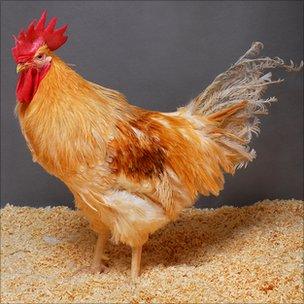World's first flu-resistant GM chickens 'created'
- Published
Professor Helen Sang: "Not only could we use this approach to tackle bird flu but other diseases"
UK scientists have created the world's first genetically modified chickens that do not spread bird flu.
Writing in Science journal, the team says their work demonstrates it is possible to create a variety of GM farm animals resistant to viral diseases.
The research team inserted an artificial gene into chickens; this introduces a tiny part of the bird flu virus into chicken cells.
These birds become infected but render the virus harmless to other poultry.
The team believes that the genetic modification they have introduced is harmless to the chickens and to people who might eat the birds.
Professor Helen Sang of Edinburgh University told BBC News that genetic modification is potentially a much better way of protecting against diseases than vaccination because the GM technique works even if the virus mutates.
"It will protect a whole flock from avian influenza infection. This is really exciting because bird flu is a real challenge to poultry production and if it were introduced to poultry breeding it would protect our large scale production flocks from avian inlfuenza," said Professor Sang.
Broad protection
The researchers say that, in principle, the technique could be used to protect any farm animal from any disease. The eventual aim is to develop animals that are completely resistant to viral diseases.

Genetic modification could be an alternative to vaccination, scientists say
According to co-author Dr Laurence Tiley, from the University of Cambridge, UK: "Agricultural selective breeding has made huge improvements on productivity of many livestock - but it's reaching the point where it's now limited.
"And the GM technologies allow you to introduce novel genes that don't exist in nature but are based on our detailed knowledge of the molecular biology of viruses. We can specifically target these viruses to prevent them from replicating."
The researchers say they think the technology has the potential to boost food production and reduce costs.
"There's going to be a real problem in feeding the world as the population increases," says Professor Sang.
"As the demand for animal products increases and it's going to get increasingly expensive and we are looking at different ways to tackle that problem."
GM techniques could also have benefits for human health, according to Professor Sang. If fewer animals are carrying viruses there is a lower chance of them mutating into a form that would be deadly to humans and so create a pandemic.
Cautious welcome
But the news received a cautious welcome from the poultry industry. Peter Bradnock of The British Poultry Council said more research was needed to assess the long term impact on farm animals before food producers would even consider using the technology.
Even then, companies would have to assess the likely reaction from consumers: "We have to have a big debate as to whether society wants to have GM animals even for this very good potential benefit," he told BBC News.
And Tim Elsdale, who is an organic farmer in East Sussex, said it was better to adopt good farming practices to avoid animals getting diseases in the first place than to create GM farm animals.
"We don't suffer much from animal diseases on this farm," he said.
"Organic methods of husbandry doesn't encourage disease if the animals are well spaced enough. They live in a natural environment and they eat normal food then a lot of diseases that are prevalent on conventional farming would not be apparent to us".
If the food and farming industry did want to use GM technology in this way in the UK, they would need to seek prior approval from the Food Standards Agency (FSA). The FSA would conduct a full detailed safety evaluation before any of this GM produce could enter the market.
In addition to that, produce would need to be labelled so that consumers would be able to make a choice about the food they eat. If there were an application, the authorisation process could be carried out in a matter of months.
The FSA's Chief Scientist, Dr Andrew Wadge said it would be interesting to see if the debate over GM animals would go the same way as the debate over GM crops:
"I do think it's interesting that so far with GM technology it's not really a benefit for consumers and wouldn't it be interesting if we had produce that did offer a benefit?
"For example, food safety for us is about a bacteria found in chickens called Campylobacter which makes 500,000 people ill each year.
"If we could develop a GM chicken that is resistant to Campylobacter it would be very interesting indeed to see how consumers saw that technology and whether it was a technology they would be willing to embrace".
- Published4 January 2011